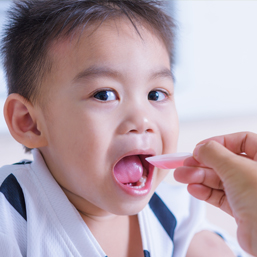
Your medicine cabinet is an essential part of your family's day-to-day health. By planning ahead, you can make sure you have everything you need to take care of coughs, colds, stomach issues, pain, fever, skin issues, dental care, or any other middle-of-the-night emergencies.
Use this helpful list of medicine cabinet must-haves to take inventory of what you currently have and fill in what you don't. Here are some things that your medicine cabinet should contain:
First aid
Skin remedies
Cough and cold remedies
Stomach remedies
Pain remedies
Where should I keep my medicine?
Most medicine cabinets are in the bathroom, which is not an ideal place for medicines to be kept. Items that are not moisture and heat sensitive can be kept in this location, such as any first aid supplies. It is best to keep medications out of the medicine cabinet and away from the bathroom, as heat and humidity can affect medications and reduce their effectiveness. Ensure these medications have child-safe lids on them and are kept in a cool and dry location where a child would not be able to access them.
Expired medications
You should also be regularly checking expiry dates on items in your medicine cabinet and any regular medications your family uses. Although expired medications are generally not harmful, they lose their effectiveness once they are beyond the expiration date.
I would recommend that you go through your medicine cabinet twice a year; perhaps time it with something like daylight savings time. Any expired medications you find should be properly disposed of. Do not flush medications down the toilet, dump them down the drain, or throw them in the garbage. All pharmacies will take back “dead drugs” and send them off for proper and safe disposal. This also applies to any sharp items such as needles; however, these items should be brought to the pharmacy in a sharps container that you can get from your local pharmacy.
Ask your pharmacist
Pharmacists are a great resource for help stocking and maintaining your medicine cabinet. They are also helpful with any dosing questions, especially for children’s medications, which should be dosed based on weight in most cases. Confirming that you are giving the right medication and the right dose at the appropriate times is something any pharmacist will be able to help you with.
Emergencies often happen at the most inconvenient times, so being prepared is important to ensure you can help with minor health conditions that don’t require a trip to the hospital. Talk to your pharmacist to make sure you have the right products in your medicine cabinet, you are storing medications in safe locations that will not damage them, and in a location that cannot be reached by children.
Editor’s Note: Always consult with a pharmacist or your doctor before taking or giving your children any new medications, and consider taking a First Aid course for basic instruction on wound care. If you’re not sure what to do, you can call Health Link at 811 for assistance 24 hours a day.
Jason is the owner and operator of Pharmasave On Northmount in Brentwood, Calgary. You can contact him and his team at 403-282-1208.
See our related articles:
What dangers are lurking in your medicine cabinet?
Calgary’s Child Magazine © 2024 Calgary’s Child